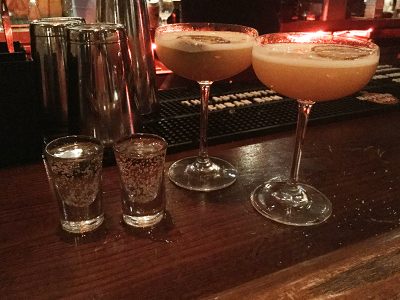An overview of the Welsh Whisky market
When Penderyn launched their first whisky in 2004, it was the first time in almost a 100 years that whisky had been produced in Wales. Penderyn being the only distillery also meant that Wales did not have a whisky industry according to European Regulations. This changed in 2016, when the Dà Mhìle Distillery started bottling and commercialising whisky. Since then, they have been joined by the Anglesey Mon Distillery in 2018, and Aber Falls will further expand the Welsh market by 2020.
.
What is nosing and tasting?
You don’t want to come in without knowing anything about it? Here are Penderyn’s little tips:
Stage 1 : Appearance: Note the colour and brightness.
Stage 2 : The nose: First, what is the effect on your nose? Is the smell pungent, prickly, warming, drying? Second, how ‘forward’ or ‘shy’ is it? Don’t inhale too deeply, as the strength of the alcohol vapours may dull your senses, causing ‘palate fade’. Third, work through this checklist of aroma groups:
-
Cereal notes: malt, toast, vegetable
-
Ester notes: fragrant, fruity, flowery
-
Aldehyde notes: hay, leaves, flowers
-
Sweet notes: honey, vanilla
-
Wood Notes: new wood, resin, old wood
-
Oily Notes: nutty, buttery, fatty
Stage 3 : Primary taste: What are the initial flavours you pick up as the liquid slides over your taste buds? Are they sweet, sour, salty, bitter?
Stage 4 : Back of palate: As you swallow, is the back-palate flavour consistent with that promised by the bouquet and first taste? Or is it beginning to show different characteristics?
Stage 5 : Aftertaste: Is it a short finish, a rapid fade, or does the flavour linger like a summer sunset over the Brecon Beacons? Welsh malts will linger on your taste buds.
Indulge in a 2-hour long nosing and tasting experience featuring Penderyn spirits at Wally’s Delicatessen this November

Curious minds and beverage aficionados will get to discover the intricacies of whisky this 13 November as Wally’s Delicatessen holds a special masterclass from 3-6pm.
Penderyn whiskies will be the star of this session, during which people will get to taste at least six variants and learn about the art of whisky at Wally’s Royal Arcade shop.
Stewart Meyer, manager at Wally’s Delicatessen, said, “With this masterclass, people will get an in-depth view of the process of whisky making.”
Penderyn whiskies take their uniqueness in the casks they are aged in – sherry casks. “Welsh whisky cannot be aged 8, 10 years like Scottish whisky can be,” said Stewart, “so they focused on having a fantastic flavour.”
If the thought of drinking Welsh whisky might have surprised not so long ago, taking part in the growth of the national market is now a question of Welsh pride. Stewart added, “It’s also always good to support local businesses.”
Even if newcomers like Dà Mhìle Distillery are starting to pop in the market, Stewart commented, “Penderyn flies high.” As Wally’s Delicatessen offers their full range, which cannot be found everywhere, the shop’s higher sells are without a doubt Penderyn whiskies. Stewart added, “Their new ‘Rich Oak’ is a favourite.”
The success of Welsh whisky is however not limited to Wales as it is gaining global recognition. Indeed, on 22 October, Penderyn’s Madeira Single Cask Edition was named ‘European Whisky of the Year’ by whisky expert Jim Murray.
Stephen Davies, CEO of Penderyn, talked to the Wine and Spirit Trade Association (WSTA) about the market’s growth last June. “Demand for our products is increasing year on year,” he said, “Penderyn’s sales went up by 17% in 2018, and we now export to around 40 different countries.”
Stewart concluded, “Everybody loves Penderyn… but especially the Welsh!”
An overview of the Welsh Whisky market
When Penderyn launched their first whisky in 2004, it was the first time in almost a 100 years that whisky had been produced in Wales. Penderyn being the only distillery also meant that Wales did not have a whisky industry according to European Regulations. This changed in 2016, when the Dà Mhìle Distillery started bottling and commercialising whisky. Since then, they have been joined by the Anglesey Mon Distillery in 2018, and Aber Falls will further expand the Welsh market by 2020.
.
What is nosing and tasting?
You don’t want to come in without knowing anything about it? Here are Penderyn’s little tips:
Stage 1 : Appearance: Note the colour and brightness.
Stage 2 : The nose: First, what is the effect on your nose? Is the smell pungent, prickly, warming, drying? Second, how ‘forward’ or ‘shy’ is it? Don’t inhale too deeply, as the strength of the alcohol vapours may dull your senses, causing ‘palate fade’. Third, work through this checklist of aroma groups:
-
Cereal notes: malt, toast, vegetable
-
Ester notes: fragrant, fruity, flowery
-
Aldehyde notes: hay, leaves, flowers
-
Sweet notes: honey, vanilla
-
Wood Notes: new wood, resin, old wood
-
Oily Notes: nutty, buttery, fatty
Stage 3 : Primary taste: What are the initial flavours you pick up as the liquid slides over your taste buds? Are they sweet, sour, salty, bitter?
Stage 4 : Back of palate: As you swallow, is the back-palate flavour consistent with that promised by the bouquet and first taste? Or is it beginning to show different characteristics?
Stage 5 : Aftertaste: Is it a short finish, a rapid fade, or does the flavour linger like a summer sunset over the Brecon Beacons? Welsh malts will linger on your taste buds.




